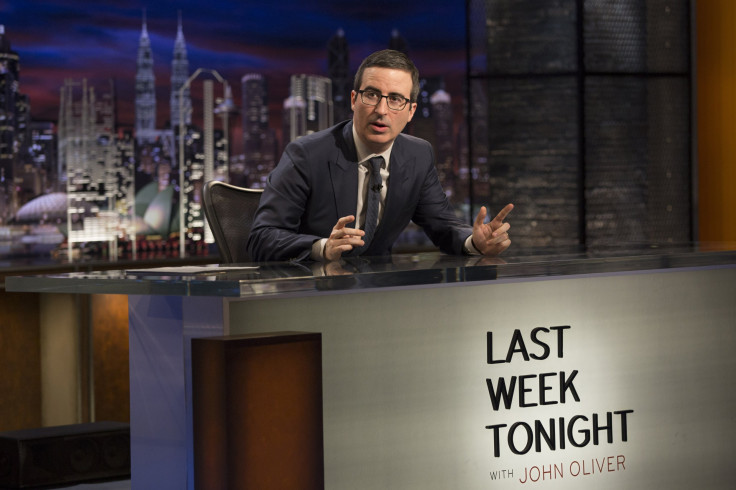Apple v. FBI: John Oliver Defends Tech Company In iPhone Dispute On 'Last Week Tonight' [VIDEO]

John Oliver is taking sides in the Apple v. FBI case. The host of HBO's "Last Week Tonight" dedicated his show Sunday to explaining encryption and defending Apple's position in the complicated debate.
Oliver spent almost 20 minutes of his live show Sunday discussing the ongoing dispute over whether Apple is obligated to obey FBI orders to help unlock an iPhone connected to the San Bernardino, California, terror shootings on Dec. 2, 2015. Apple CEO Tim Cook has maintained that to grant the FBI's request, his company would need to invent a “backdoor” around the phone's encryption security features, which would jeopardize the future privacy of its customers.
After breaking down encryption for viewers who might not be so tech-savvy, the comedian pivoted to explaining why those who believe that Apple should be able to easily create a one-time fix to gain access to the San Bernardino iPhone may be oversimplifying the situation.
"An encrypted phone is not really like a bank or a safe," said Oliver. "If you penetrate a safe, you've only penetrated that safe, but a code to open a phone could be modified to open many, many more phones."
Oliver later pointed out that in the 1990s, when encryption first became an issue, law enforcement pressed the tech industry to create something called Clipper Chips in phone and devices, which would allow law enforcement to access private information only in necessary situations. Oliver, noting that the effort was a failure, said the idea was problematic, comparing the situation to lending a trusted neighbor a house key.
"You can trust Mark," joked Oliver. "He's only going to try on your underwear if it's absolutely necessary."
Oliver criticized lawmakers who have compared Apple's insistence that creating a hack-proof "backdoor" was impossible to people who doubted President John F. Kennedy's promise to go to the moon by the end of the 1960s. The host then listed unintended consequences that could arise if Apple complied with the FBI's request.
“The FBI and its supporters can be weirdly dismissive of [the encryption] issue, in ways that indicate they don’t fully understand how technology works — or are pretending not to,” he said.
It was not the first time the Apple controversy appeared in the late-night comedy arena. U.S. Attorney General Loretta Lynch appeared on "The Late Show with Stephen Colbert" Thursday to defend the government's position in the debate.
"We are not asking for a backdoor, nor are we asking [Tim Cook] to turn anything on to spy on anyone,” Lynch told host Stephen Colbert. “We’re asking them to do what their customer wants,” Lynch explained, referring to the San Bernardino County Department of Public Health, which employed one of the two shooters in the case and owned the phone. “[The FBI's request] is very narrow, and it’s very focused.”
Meanwhile, tech leaders gathered at the tech and media conference South by Southwest in Austin, Texas, this week have been echoing Apple's concerns about jeopardizing consumer privacy.
“We have to meet the expectations and needs of our customers,” said Mike Hintze, Microsoft’s chief privacy counsel. "If we build in things that create a workaround, it’s not just going to be good guys using it."
© Copyright IBTimes 2024. All rights reserved.












